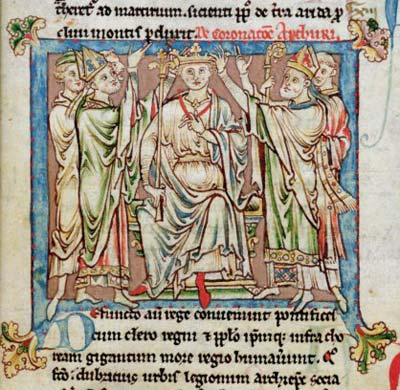Medieval Historians
My original interest in this area related to the works by Matthew Paris,
an English Benedictine monk.
There is a more complete list of Medieval Historians to be found on Wikipedia. It is not the purpose of
my account to complete with this. Paris was suggested to be the artist responsible for the Madonna and Child that
can be found in St. Mary's Church Belchamp Walter. He probably was an influence for some of the other writings of
the two Victorian Historians
that I use as primary sources on these pages.
The main Anglo-Norman historians according to Wikipedia:
In addition Alexander of Lincoln, the predesessor of Henry of Huntington.
Top
Henry of Huntingdon
"
Henry of Huntingdon (Latin: Henricus Huntindoniensis; c. 1088 – c. AD 1157), the son of a canon in the diocese of Lincoln,
was a 12th-century English historian and the author of Historia Anglorum (Medieval Latin for "History of the English"),
as "the most important Anglo-Norman historian to emerge from the secular clergy".[1] He served as archdeacon of Huntingdon.
The few details of Henry's life that are known originated from his own works and from a number of official records.
He was brought up in the wealthy court of Robert Bloet of Lincoln, who became his patron.
"
"
At the request of Bloet's successor, Alexander of Lincoln, Henry began to write his Historia Anglorum, first published
around 1129, an account of the history of England from its beginnings up to the year 1154.
"
John of Worcester
John of Worcester (died c. 1140) was an English monk and chronicler who worked at Worcester Priory.
He is now usually held to be the author of the Chronicon ex Chronicis.
William of Poitiers
Wilipedia say:
William of Poitiers (Latin: Guillelmus Pictaviensis, French: Guillaume de Poitiers; c. 1020 – 1090)
was a Norman priest who served as the chaplain of Duke William II of Normandy (William the Conqueror),
for whom he chronicled the Norman conquest of England in his Gesta Willelmi ducis Normannorum et regis
Anglorum ("The Deeds of William, Duke of the Normans and King of the English").
He had trained as a soldier before taking holy orders.
Poitiers describes events at the Battle of Hastings
and I have a page dedicated to him.
Alexander of Lincoln
Alexander of Lincoln was bishop of Lincoln.
"
Under Henry's successor, King Stephen, Alexander was caught up in the fall from favour of his family, and was
imprisoned together with his uncle Roger in 1139. He subsequently briefly supported Stephen's rival,
Matilda, but by the late 1140s Alexander was once again working with Stephen. He spent much of the late 1140s at
the papal court in Rome, but died in England in early 1148.
"
Battle of Lincoln (1141)
Battle of Lincoln
